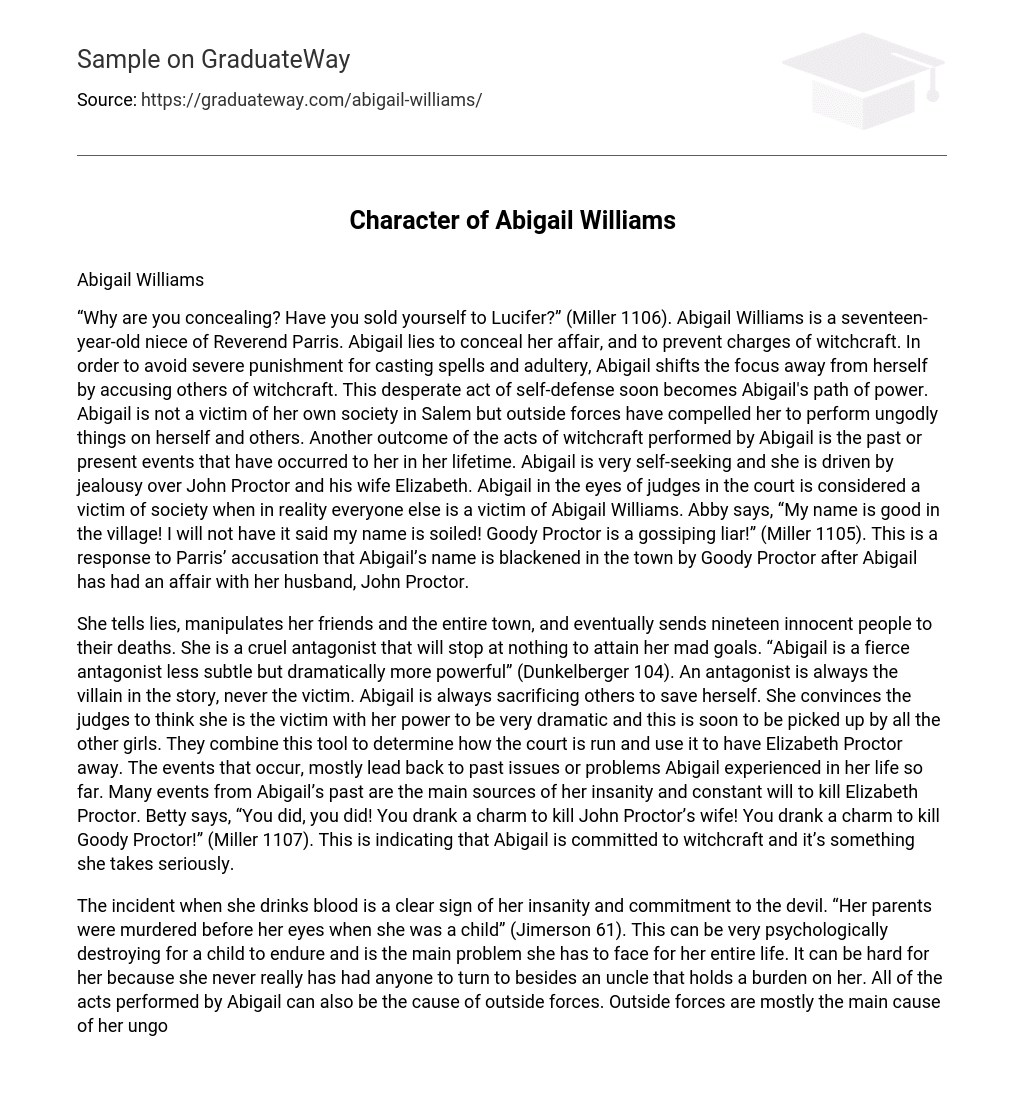Abigail Williams
Abigail Williams, the seventeen-year-old niece of Reverend Parris, tells lies to conceal her affair and avoid being accused of witchcraft (Miller 1106). She accuses others of witchcraft in order to deflect attention from herself and escape punishment. This desperate act becomes a source of power for Abigail. However, she is not only a victim of Salem’s society; external influences also drive her to commit ungodly acts. The jealousy she feels towards John Proctor and his wife Elizabeth primarily motivates her actions. Despite portraying herself as a victim, Abigail is actually victimizing everyone else. When accused by Parris that her reputation has been tarnished by Goody Proctor, Abigail defends herself by stating that her name is still respected in the village and accuses Goody Proctor of spreading lies (Miller 1105). This statement addresses the consequences of Abigail’s affair with John Proctor and the allegations made against her by Goody Proctor.
The passage describes Abigail as a cruel antagonist who lies, manipulates her friends and the town, and causes the deaths of nineteen innocent people. According to Dunkelberger (104), she is a fierce and powerful antagonist. She is always sacrificing others to protect herself and convinces the judges that she is the victim through dramatic displays. This influences the other girls and they use this tactic to control the court and have Elizabeth Proctor removed. Abigail’s past experiences are the main sources of her insanity and her determination to kill Elizabeth Proctor. In fact, Betty accuses Abigail of using witchcraft to kill John Proctor’s wife (Miller 1107), indicating Abigail’s serious commitment to such practices.
The incident of drinking blood is a clear indication of her madness and allegiance to the devil. According to Jimerson (61), she witnessed the murder of her parents as a child, which had a profoundly damaging effect on her psychological well-being. She has always struggled with this traumatic experience, with limited support from her burdened uncle. It is possible that outside influences played a significant role in Abigail’s actions. As Murray (68) asserts, Abigail’s main motive is to ruin Elizabeth Proctor and engage in a relationship with her husband, John. Jealousy takes over and drives Abigail to manipulate the court by using her dramatic abilities, falsely accusing Elizabeth of practicing witchcraft.
According to Jimerson (61), the desire for revenge in Salem unleashes hidden hatreds and fears, although Abigail is not the reason for those negative emotions. The power of revenge drives Abigail to maintain her deceptive behavior in the town. Throughout the play, Abigail’s main motivation is to separate John from his wife and seek vengeance on her for tarnishing her reputation. While Abigail is not a victim of her society in Salem, external forces have influenced her to engage in sinful acts on herself and others. Furthermore, Abigail’s acts of witchcraft have brought about consequences from past and present events in her life. She is extremely self-centered and will go to any lengths to eliminate Elizabeth Proctor and claim John Proctor for herself.





